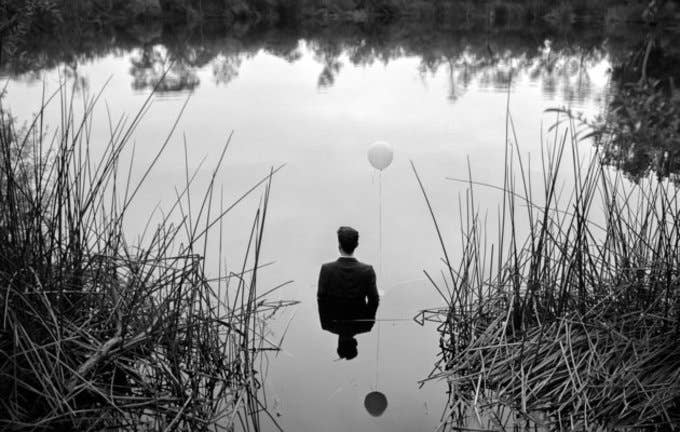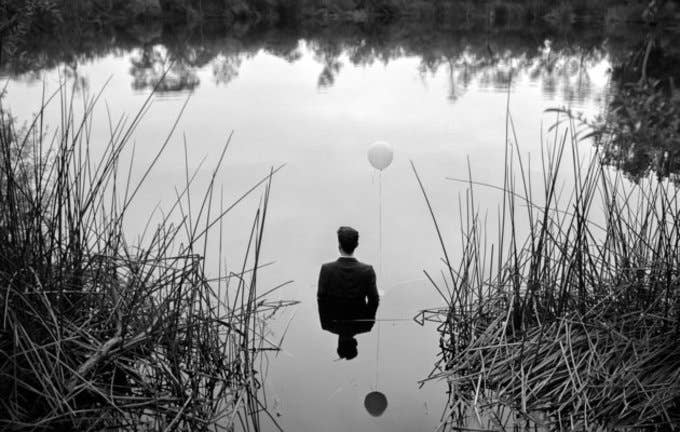
Social media is currently plastered with posts surrounding Prison Break actor Wentworth Miller and singer Kehlani's public acknowledgments of their battles with depression and suicidal thoughts, though it's not new for celebrities to offer insight into their troubles with mental health.
Chart-topping British rapper Professor Green recently starred in a BBC documentary in order to raise awareness for young men committing suicide—the biggest cause of death in men under the age of 50. It also recently became the most frequent cause of death among teenage girls, and yet there still remains this stigma about mental health. A lot of the conversation surrounding the struggles of Miller and Kehlani has been that of countless memes and jokes; mostly by trolls, but also a lot by well-respected figures within hip-hop culture—the same culture that helped me overcome my own demons.
Around four years ago, I was indescribably close to suicide. Did I really want to go through with it? No. But at the time, it felt like the only way out. And that's what the trolls don't seem to understand. Those who have never experienced depression couldn't hope to understand it, but the least they could do is be respectful in doing so. Are those few retweets really worth making someone who's possibly at their lowest feel like there is only one way of escaping that pain?
Today, for the first time in months, I found myself in an all-too-familiar position of not wanting to get out of bed; I wanted to remain wrapped in my duvet—curtains closed—and immerse myself in the world of Netflix. One quick scroll of Twitter evoked memories of the past four years, a rollercoaster ride of seemingly "recovering" from the disease, only to fall right back into it. At the start of this year, I finally opened up to my mum about my depression and went to the doctors for treatment. The treatment itself didn't work, but the opening up and having conversations about it certainly did. It was having those conversations that has led to a positive start to 2016 for me.
Just this weekend, I quit my job in order to focus on making a career in music, and I couldn't think of a better way of starting my return to hip-hop journalism than a piece dedicated to hip-hop and depression and how the music saved my life.
I was indescribably close to suicide. Did I really want to go through with it? No. But at the time, it felt like the only way out.
Joe Budden is a cult hero to suicidal millennials, but perhaps best known to mainstream audiences for mid-2000s hit "Pump It Up", various allegations, and pioneering reality television. Joe Budden TV was Love & Hip-Hop way before the man himself starred on the VH1 show. His transparency in the majority of his discography is brutally honest, sometimes even too honest, but if the solution to the rising suicide epidemic is to talk about it openly, the Mood Muzik legend is leading the way. Joe's Mood Muzik 4.5 mixtape (the .5 is very important) was very instrumental in helping me cope. "To anyone who ever loved me, I apologise and I'm sorry," he raps on the intro. And, in a sense, that perfectly encapsulated how I felt. Joe's personal demons were very different to mine, but that's not important because his music offered a one-size-fits-all style solution.
It might not have been enough to make everything sunshine and rainbows, but the idea that somebody else felt similar to how I did allowed me some kind of peace. Elsewhere on the mixtape, records such as "1,000 Faces", "Inseparable", "Follow My Lead" and "Black Cloud" all played a part in me coping with my depression. As I started feeling brighter, lyrics like "when tomorrow comes, I know it's only due to yesterday" (from "Stuck In The Moment") helped me to appreciate that time because it made me stronger. And, to this day, "Downfall" remains very poignant. Just this morning I was awestruck at how much the following still applies:
"No moment of clarity,
The next fight showing is a rarity,
Severity in me against my growing popularity,
Rappers won't rap, I'm forced to believe they scared of me,
But can no longer use the scapegoat they're not aware of me,
So y'all can go and throw your little pot shots,
Some dudes dissed me and temporarily got hot,
I'm getting my head right, recollecting"
I've accomplished a whole load of goals in the last few months: the hip-hop acts I manage are back on top form, I've just started my very own radio show, my writing is now appearing on Complex (!) and I'm going to be Best Man at my best mate's wedding. In 2015, I dealt with a lot of hate from local rappers who didn't agree with my honest style of writing reviews and it's nice to know that, according to various peers, I've now established myself as one of the key voices within the North-East England hip-hop scene. And that's the beauty of Budden's music: the same line that comforted you during periods of depression can evoke confidence in you in times of happiness.
But, back to Professor Green. The Hackney-born rapper has starred in various documentaries discussing his father's suicide and his own personal depression, but his music hits that much deeper for me. Something about music allows me to connect with the message more-so than in a TV or radio show. "Today I Cried", for example, is an absolute masterpiece and should be handed out at counselling sessions. Pro Green has also dealt with his demons in other records such as "Read All About It" featuring Emeli Sande and "Lullaby" featuring Tori Kelly. Similarly to Budden, my issues differ from those of his, but his discussion of it helped because he perfectly described how it felt. The moral of this story? Instead of making jokes for RTs on Twitter, when it's revealed a person of any status is dealing with personal struggles, we should aim to understand and comfort them as opposed to openly mocking them for the world to see. My heart goes out to Kehlani, Wentworth Miller and anybody else dealing with mental health issues of any kind.
Speaking as someone who, right now, feels on top of the world, I can only recommend listening to the likes of Joe Budden and Pro Green—artists who use their platform to offer insight and understanding to these issues and will hopefully influence others to in turn make music with similar themes. I can't thank them enough for the impact they've had on my life, but the next best thing I can do is use what voice I've created for myself to hopefully help them, help others.

